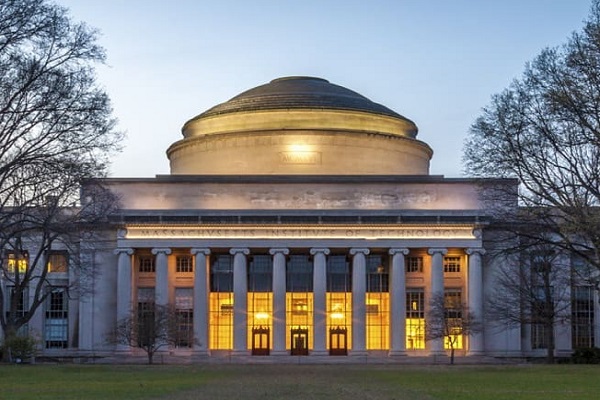Massachusetts Institute of Technology: MIT AgeLab awards five scholarships to students who further intergenerational connections
Since 2015, the MIT AgeLab has awarded scholarships to high school students who developed intergenerational programs — initiatives that bring together younger and older people for knowledge-sharing and social connection — in their communities. On Sept. 9, five $5,000 OMEGA scholarships were given to high school students across the United States, supported by the sponsorship of AlerisLife, a senior living and rehabilitation and wellness services company headquartered in Newton, Massachusetts, and AARP.
OMEGA, which stands for Opportunities for Multigenerational Exchange, Growth, and Action, develops programming and offers scholarships to facilitate intergenerational connections between younger people and older adults in their communities.
The scholarships were awarded at a virtual ceremony hosted by the MIT AgeLab, with representatives from the AgeLab, AARP, and AlerisLife in attendance, along with the scholarship winners, their parents, and mentors.
Intergenerational programs have numerous potential benefits. They may have positive impacts for the health and well-being of older participants, reducing social isolation and fostering a sense of meaningfulness. They may provide a similar sense of meaning for younger people, as well as exposing younger participants to perspectives and wisdom that often come only with age. And younger participants may have their own knowledge to impart to older adults.
But the simplest reason to develop such programming, suggests Steven Griffon, interim director of AARP Massachusetts, is the enjoyment that it can bring to participants of all ages. “At AARP, we work with those 50 and older, but really we work with everybody,” Griffon said at the OMEGA award ceremony. “In my normal day-to-day role, I do a lot of work on issue campaigns, and the No. 1 thing that I try to remind folks is [that] it’s key to have fun. Folks who are older love to have fun, and folks who are younger love to have fun.”
The five scholarship winners and their winning programs are:
Cora Funk, senior at Valor Collegiate Academy in Nashville, Tennessee. After attending an OMEGA Summit in 2020, Funk developed “Students Connecting with Seniors,” a club connecting local high school students with older adults in the Nashville community. SCS primarily partners with FiftyForward, a local nonprofit organization.
Maya Joshi, senior at Walter Payton College Preparatory High School in Chicago, Illinois. Joshi is the president and founder of a chapter-based nonprofit “Lifting Hearts with the Arts,” which connects older adults and youth for arts-based, one-on-one activities as well as group programming including trivia, art lessons, and tai chi.
Maya Lall, senior at Holton-Arms School in Bethesda, Maryland. Lall founded and serves as executive director of “Supporting Seniors,” which provides older adults with technology support through video demonstrations, virtual and in-person troubleshooting, and technology courses at local senior living communities including Five Star Premier Residences of Chevy Chase and Aspenwood Senior Living Community.
Steven Yang, senior at Wayzata High School in Plymouth, Minnesota. Yang is founder and president of “Zenith,” which partners with TCM Health Center to train high school student volunteers to teach tai chi classes in local residential and assisted living communities.
Michael Wilson, now a student at Rose-Hulman Institute of Technology in Terre Haute, Indiana. Wilson coordinated a local chapter of the Arizona Old Time Fiddlers Association. His program, “Bridging the Gap through Music,” fosters intergenerational interactions through acoustic music jams and performances. He is also a lead speaker, singer, and mandolin player in the band “Six Gal ‘n Hat,” which plays music for older adults at local events.
In the remarks he gave in accepting his award, Wilson emphasized the benefits he received from intergenerational connections as well as those gained by his older counterparts. “Just hanging out with people who are my age, even though it might be comfortable, I don’t stand to benefit very much,” Wilson said. “It’s not only that I’m willing to sacrifice my time to enrich someone else’s life, but they’re enriching my life. That’s something that I really want to convey to my generation. We have the opportunity to glean things that would take another 50 or 60 years to learn.”
In addition to recognizing their work with college scholarships, the AgeLab’s OMEGA program works year-round with students to develop their intergenerational programs. Students interested in intergenerational programming and careers in aging are invited to attend the virtual 2022 OMEGA Summit on Oct. 15.
The MIT AgeLab was created in 1999 within the MIT Center for Transportation and Logistics in order to invent new ideas and creatively translate technologies into practical solutions that improve people’s health and enable them to “do things” throughout their lifespan. Equal to the need for ideas and new technologies is the belief that innovations in how products are designed, services are delivered, or policies are implemented are of critical importance to our quality of life tomorrow.

